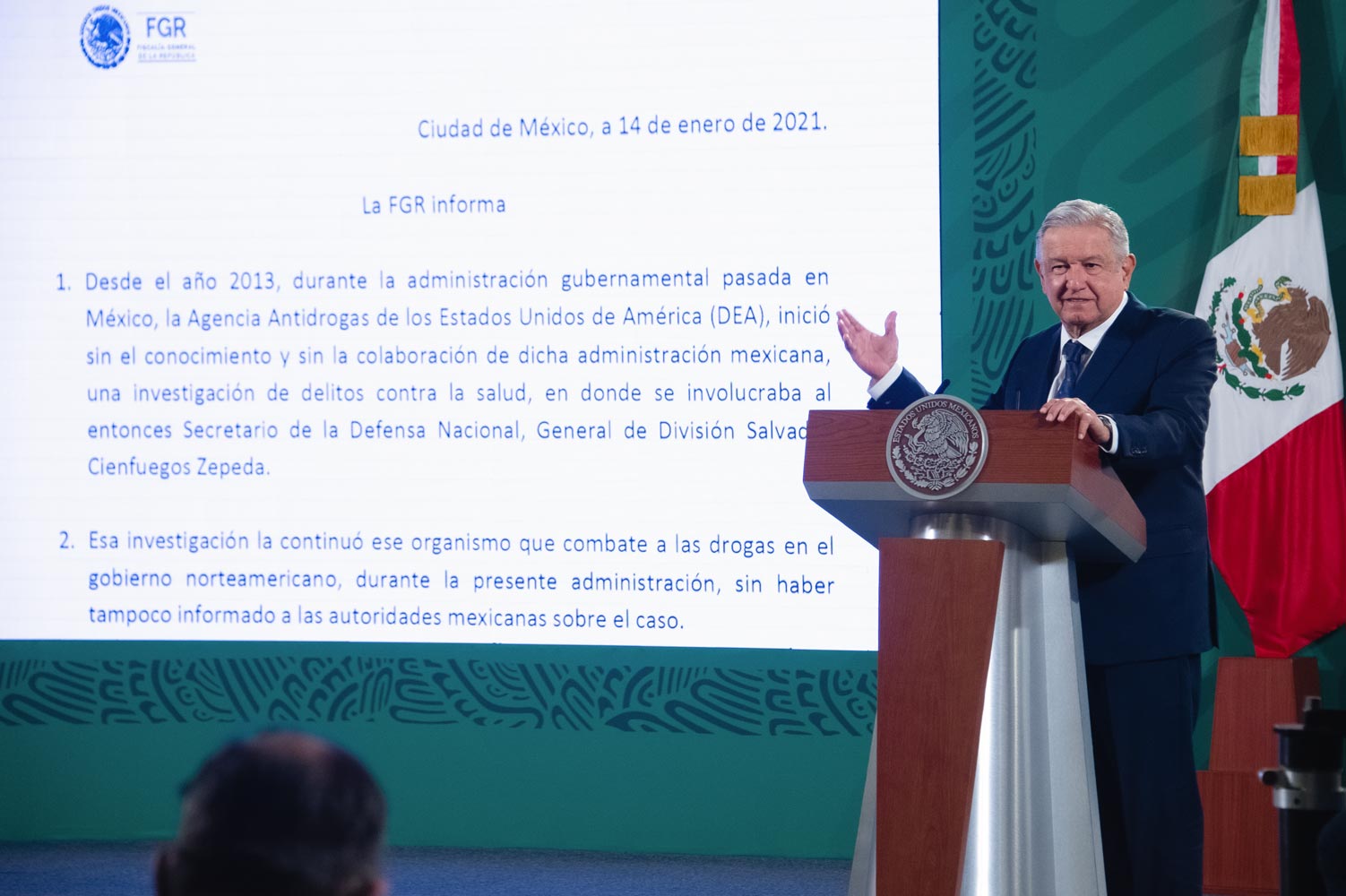The Drug Enforcement Administration’s imperialist grasp on Mexico seems to be loosening. President Andres Manuel López Obrador has called out the US Justice Department (DOJ) for “fabricat[ing]” narco-trafficking accusations against one of the country’s top military figures, publicly releasing the prosecution’s 700-plus pages of evidence to reveal the case’s flimsy basis.
“We do not want speculation, conjecture, the fabrication of crimes, revenge and we do not accept intimidation. We are a free, independent and sovereign country,” AMLO, as the president is known, said on January 15, regarding the October arrest of former Defense Minister Salvador Cienfuegos-Zepeda on drug conspiracy charge at Los Angeles International Airport.
According to a letter from the DEA’s then-Acting Administrator Timothy Shea to Mexico’s foreign affairs secretary (see below), wiretapped text messages suggested Cienfuegos-Zepeda to be a co-conspirator in drug trafficking. The messages suggested that he was divulging details of DEA investigations and steering military interventions away from the region of Patron-Sanchez’s operations.
informacion_recibida_por_la_sre_sobre_el_caso_del_general_retirado_salvador_cienfuegos_zepeda
Letter by DEA’s Timothy Shea and evidence regarding the case of Salvador Cienfuegos-Zepeda, as published by President Andres Manuel López Obrador on January 15, 2021
But as AMLO and his administration point out, the evidence is shaky and circumstantial. The intercepted communications were between two drug traffickers, Daniel Silva-Garate and Juan Francisco Patron-Sanchez. They referred to an individual as “Padrino” and “Zepeda”—whom the DEA believes is Cienfuegos-Zepeda. Silva-Garate shared with Patron-Sanchez images that are believed to be messages between the former with Cienfuegos-Zepeda. The evidence provided by the DEA and publicly released by AMLO does not appear to directly substantiate the military leader’s involvement.
“The evidence will show that he received bribes from the Patron-Sanchez organization in exchange for providing protection, safe passage of narcotics and weapons into Mexico City, and military and law enforcement operations in Mexico,” wrote Shea.
Yet after reviewing the DOJ’s file and records provided by Cienfuegos-Zepeda, the Mexico government determined that he had no link to the drug traffickers and that there was no evidence demonstrating the alleged illegal actions.
“The conclusion was reached that General Salvador Cienfuegos Zepeda never had any meeting with the criminal organization investigated by American authorities, and that he also never had any communication with them, nor did he carry out acts to protect or help those individuals,” the office said in a statement.
“Why did they do the investigation like that?” asked López Obrador on January 15. “Without support, without proof?”
Despite Mexico’s criticism and refusal to further pursue the case, a DOJ spokesperson said it may “recommence its prosecution of Cienfuegos if the Government of Mexico fails to do so.”
For AMLO, the actions may have been politically motivated by the outgoing Trump administration. “What was the message? Who from? What were they trying to do, weaken the Mexican government, weaken Mexico’s armed forces, spark a conflict with the current government?”
Trump has pushed for even more US intervention in Mexico’s politics. In December 2019, he urged AMLO to permit more US military into the country to respond to violence believed to be cartel-related. But the Mexico president declined, saying that his country will “act with independence, according to our constitution and our tradition of independence and sovereignty.”
Since then, though, Mexican lawmakers have taken steps to regain sovereignty from US law enforcement’s asymmetric presence in the country. On December 15, 2020—exactly a month before AMLO called out the DEA—a new law was passed requiring “foreign agents,” like DEA agents, to register with the Mexican state and abide by operational restrictions.
Although Mexican politicians seem to be pushing back against the United States’ drug-war imperialism, that does not mean the militarization of the Mexico’s punitive drug policies is coming to an end. Instead, the country’s military has gained mounting political influence, as it’s used to roll out infrastructure construction and COVID-19 policies.
The swift clearing of Cienfuegos-Zepeda’s name, for many commentators, exemplifies that. “From the Mexican side, this signals the deep-seated control the military as an institution has on power. It also shows that the level of complicity at play in this case,” historian Gladys McCormick of Syracuse University told PBS News Hour.
Photograph of Mexico President Andres Manuel Lopez Obrador on January 15, 2021 by the Office of the President/Public Domain





Show Comments